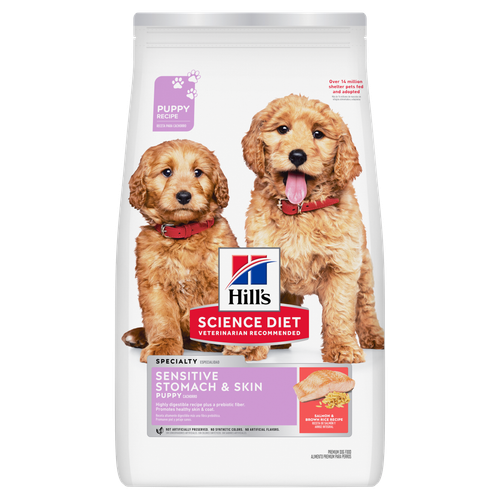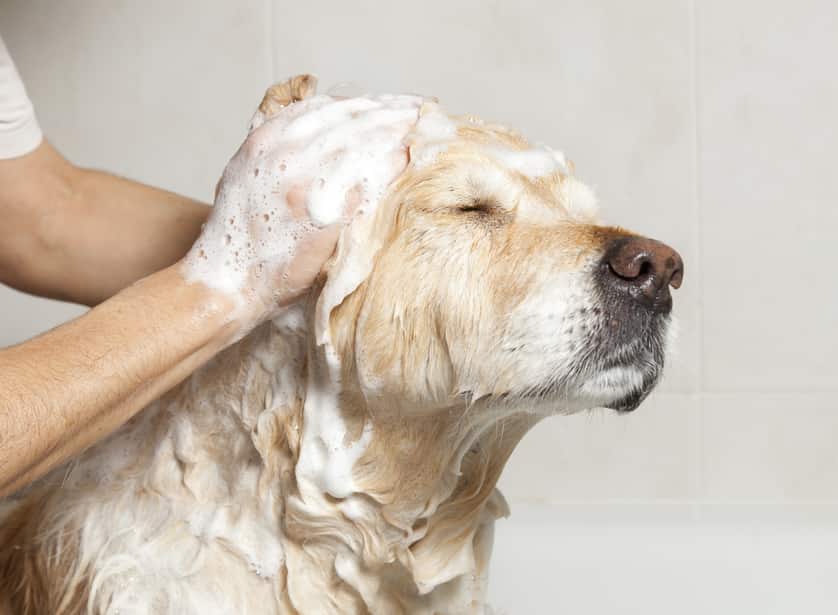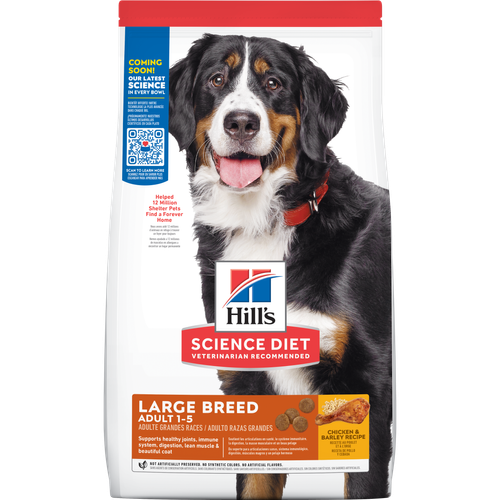
-
Find the right food for your petTake this quiz to see which food may be the best for your furry friend.Find the right food for your petTake this quiz to see which food may be the best for your furry friend.Featured products
 Puppy Sensitive Stomach & Skin Salmon & Brown Rice Recipe
Puppy Sensitive Stomach & Skin Salmon & Brown Rice RecipeDelicious, highly digestible recipe, gentle on stomachs. Nourishes skin & promotes a lustrous coat
Shop Now Adult Chicken & Barley Recipe Dog Food
Adult Chicken & Barley Recipe Dog FoodSupports lean muscle and beautiful coat for adult dogs
Shop Now Puppy Large Breed Chicken & Brown Rice Recipe
Puppy Large Breed Chicken & Brown Rice RecipeVital nutrients to support 5 essential building blocks for lifelong health
Shop NowFeatured products Kitten Chicken Recipe
Kitten Chicken RecipeVital nutrients to support 5 essential building blocks for lifelong health
Shop Now Adult Urinary Hairball Control Chicken & Rice Recipe Cat Food
Adult Urinary Hairball Control Chicken & Rice Recipe Cat FoodActively supports the health of the whole urinary system
Shop Now Adult 7+ Chicken Recipe Cat Food
Adult 7+ Chicken Recipe Cat FoodSupports energy level and beautiful fur in mature cats
Shop Now -
Dog
- Dog Tips & Articles
-
Health Category
- Weight
- Food & Environmental Sensitivities
- Urinary
- Digestive
- Joint
- Kidney
-
Life Stage
- Puppy Nutrition
- Adult Nutrition
- Senior Nutrition
Cat- Cat Tips & Articles
-
Health Category
- Weight
- Skin & Food Sensitivities
- Urinary
- Digestive
- Kidney
-
Life Stage
- Kitten Nutrition
- Adult Nutrition
Featured articles Water
WaterDiscover why water is the most important nutrient for your dog or cat to live a healthy life. Find out how much water your pet should consume each day.
Read More Pet Food Storage Tips
Pet Food Storage TipsDiscover how and where to store your dry, as well as canned, dog and cat food. Learn how to find the "best before" dates on all Hill's pet food packaging.
Read More The Incredible Science Behind Your Pet's Microbiome
The Incredible Science Behind Your Pet's MicrobiomeLearn what a pet's microbiome is, how it contributes to your pet's gut & overall health, and why nutrition is important in maintaining healthy microbiomes.
Read More -


You probably know a few humans who deal with dandruff, but did you know dogs get dandruff, too? Maybe you have noticed your pup scratching more often or have seen white flakes on his bedding. Besides irritated skin, these signs can also point to a skin condition called walking dandruff.
How do you know when dog dandruff warrants a veterinarian visit? Since the signs of canine dandruff can be very similar to other skin issues, it's important to know what to watch out for and the possible treatment options to consider.

The Facts About Dog Dandruff
Dandruff is the presence of dead skin cells on your dog's coat. Depending on the color of your dog's fur it may be difficult to actually see the flakes, but they are often visible when they hop off the couch or put their head in your lap. There are many ways a dog's skin can get irritated. From excessive licking to a nutritional issue, the root cause of dandruff can sometimes be difficult to identify.
The first thing to ask yourself is whether you notice the dandruff all over your pup's coat or just in a particular area. Irritated skin in one concentrated spot could be due to a reaction to something your dog came in contact with, or it could be a more serious problem like an infection or parasite. Once you notice dandruff, consider visiting your vet for help. If you notice additional signs such as itching, reddened skin irritation, or scaly patches of hair loss then the best advice would be to consult with your vet immediately for further help. Since skin issues can have genetic, environmental, nutritional or parasitic causes, sometimes several different treatment options have to be explored.


Tasty Tips
Preventing & Treating Dandruff
There are a few things you can do to prevent dog dandruff and other skin problems. Trupanion recommends that pet parents start by grooming their dogs regularly. Removing matted hair leaves less of a breeding ground for parasites, and regular brushing encourages you to spend a few minutes checking your dog's skin and coat to catch any problems early on. You should also look for seeds, burrs and sharp plants or objects they may have picked up on a walk.
Your vet might suggest bathing your dog more frequently to prevent dandruff. Wag! advises using a specially formulated dog dandruff shampoo and making sure you dry your pet thoroughly after their bath.
If simple preventative measures like grooming and bathing are not ridding your dog of dandruff, discuss special food options or allergy tests with your vet. They can help you find a dog food with omega-3 fatty acids and vitamin E that promote a healthy coat and immune system.

The Difference Between Dandruff and Walking Dandruff
A more serious possible cause for your dog's flaky, itchy skin is a condition called walking dandruff. MedVet clarifies that walking dandruff is a parasitic infection called cheyletiellosis that is caused by mites. If you notice your dog scratching, licking or biting their skin, check the area for hair loss, redness and scaly patches.
Walking dandruff is extremely contagious. The mites can easily spread to other pets in your household like cats and rabbits, and in about 20 percent of cases they can also affect humans, MedVet notes.
It is best to get your dog to the vet as soon as you notice they have dandruff coupled with redness or scaling. Unfortunately, there is no quick fix for walking dandruff. Your vet will likely administer a topical treatment called a dip that coats your dog's fur in a mite-killing medicine. Dips and other treatments may need to be repeated once or twice every week for up to six weeks. You should also bring any other household pets to the vet for mite treatment, and you may need to treat your home with a pesticide designed for killing mites and fleas.
No one likes an itchy and uncomfortable pup. Once their dandruff or other skin issues are addressed, hopefully you and your dog can enjoy more time doing the things you love, itch-free.


Chrissie Klinger is an educator, writer and mother of two children, three dogs and three cats. Her dog Jake loves sitting on her lap every chance he gets! She enjoys living an active and eco-friendly lifestyle in rural Pennsylvania.
Related products

Supports healthy joints, lean muscle, and beautiful coat for large breed dogs

Delicious, highly digestible recipe, gentle on stomachs. Nourishes skin & promotes a lustrous coat

Supports lean muscle and beautiful coat for adult dogs

Vital nutrients to support 5 essential building blocks for lifelong health
Related articles

Learn about Hill's puppy food and the nutritional benefit & high quality ingredients that it contains for your pup.

Large and giant breed puppies have different nutritional needs than other dogs. Learn how to provide the special care they need to grow up big and strong.

Proper nutrition for your pregnant or nursing dog is vital to her and her puppy's health. Learn what you should do provide her with the proper nutrients.

Understand the role that Omega-6 and Omega-3 fatty acids play in your dog's overall health, and how you can ensure they are getting enough.

Put your dog on a diet without them knowing
Our low calorie formula helps you control your dog's weight. It's packed with high-quality protein for building lean muscles, and made with purposeful ingredients for a flavorful, nutritious meal. Clinically proven antioxidants, Vitamin C+E, help promote a healthy immune system.
Put your dog on a diet without them knowing
Our low calorie formula helps you control your dog's weight. It's packed with high-quality protein for building lean muscles, and made with purposeful ingredients for a flavorful, nutritious meal. Clinically proven antioxidants, Vitamin C+E, help promote a healthy immune system.

